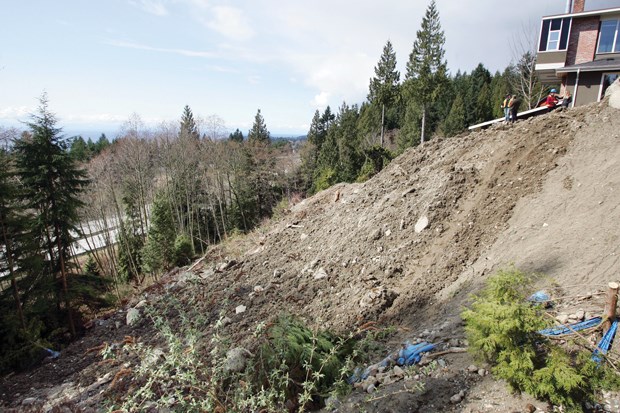West Vancouver property owners who caused a landslide to run into a fish-bearing creek after dumping truckloads of fill on their lot without required permits have been found guilty of violating a series of municipal bylaws.
In a decision handed down Oct. 20, North Vancouver provincial court Judge Bryce Dyer found homeowners Mohammadreza Morshedian and Seyedeh Shahrbanoo Janani violated West Vancouver’s watercourse protection bylaw, creeks bylaw and soil deposit and removal bylaw, when they began landscaping work on their property without permits and without a sediment control plan between January and March of 2013.
The municipality took the couple to court to prove illegal landscaping at a British Properties home they owned continued after a stop-work order was issued and eventually led to a landslide and sediment dump into Rodgers Creek.
The couple face a maximum fine of $160,000 on the charges and could also be on the hook for $80,000 the municipality spent cleaning up the spill into the creek. A date for sentencing has not yet been set.
“We’re extremely pleased at the result,” said Jeff McDonald, spokesman for the District of West Vancouver. “It sends a strong message to property owners. The district bylaws are there for a reason. And they’ll be enforced.”
Following the slide, District of West Vancouver worked quickly to install silt dams in the creek and remove the fill, said McDonald. “The was over 100 truckloads of fill,” said McDonald. “We had to get on it quickly because it’s a sensitive waterway.”
During the trial, which took place over 12 days in North Vancouver provincial court, neighbours of the rental property owned by Morshedian and Janani at 2785 Chelsea Close described their growing concern after watching dump trucks deposit massive amounts of fill on to the property between January and March 2013.
“Every time it would rain, there would be mud flowing on the side of our property,” Sam Schoenauer told the judge.
Schoenauer’s husband Fernando Casses testified he became worried when he noticed some buckling of his own driveway. “It was telling me the huge amount of tonnage was dangerous,” he said.
But Casses said when he tried to talk to his neighbour, Morshedian told him he knew what he was doing and could do whatever he wanted on his own property.
But the judge didn’t agree.
In his decision, Dyer found Morshedian had been vague and misrepresented both the work he intended to do on the property and the work that was done, both to municipal staff and to the court, said prosecutor Maegen Giltrow following the decision.
Dyer also rejected Morshedian’s arguments that there was no stream at the base of the property or that any material that entered the watercourse had come from another property.
“The judgment paints a picture of someone who is really trying to avoid responsibility,” she said.
The judge also rejected Janani’s argument that she’d never had anything to do with the work on the property because her husband Morshedian had made all the decisions. “The judge rejected that,” said Giltrow. “Owners have a duty to inform themselves about what’s happening on their property.”
The couple are joint owners for four rental properties in West Vancouver.
Derek Creighton, lawyer for Morshedian and Janani, said he believes there are still serious problems with the West Vancouver bylaws his clients were found guilty of violating because those bylaws are vague about how measurements like slope should be calculated. Under existing bylaws, property owners can deposit material up to four feet deep on their land, as long as that property meets certain slope requirements.
Creighton said his clients will not consider whether they want to appeal the decision until after sentencing, likely in December.



